Key takeaways:
- Culinary education emphasizes the connection with food, culture, and the importance of embracing mistakes as part of the learning process.
- Chef instructors play a crucial role in shaping students’ skills, confidence, and character, providing essential guidance and mentorship.
- Key lessons include the significance of preparation, flavor layering, and resilience in the kitchen, which contribute to a chef’s growth and creativity.
- Attention to detail and the ability to ask questions are vital for success, enhancing both the quality of dishes and personal development in culinary arts.
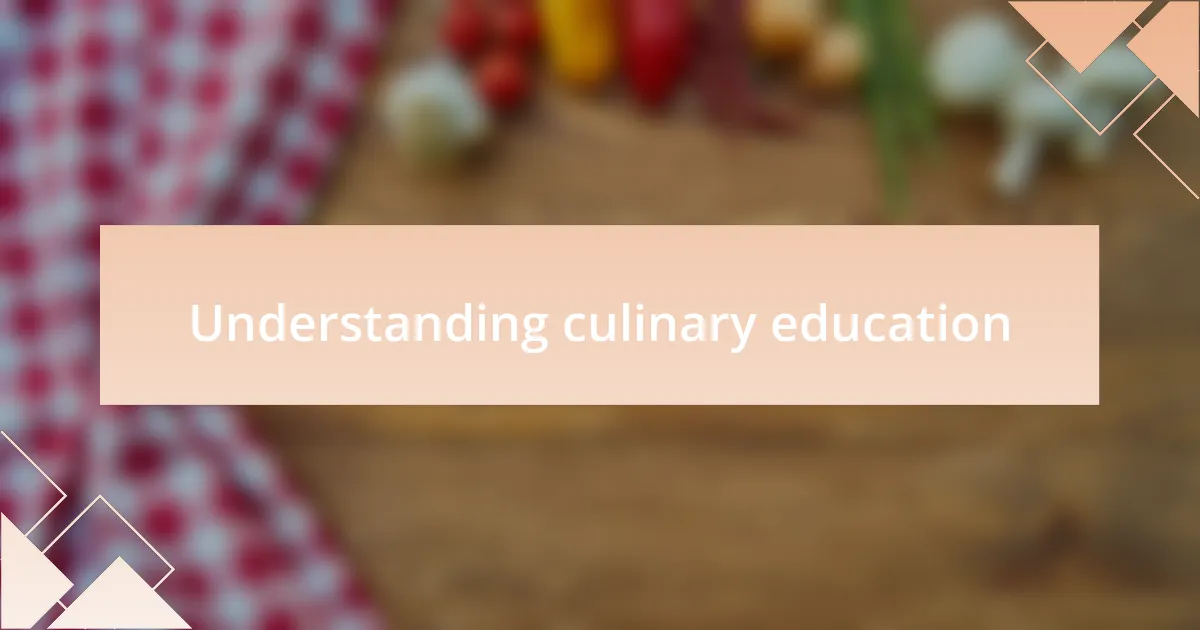
Understanding culinary education
Culinary education goes beyond just learning recipes; it’s about understanding the culture and art behind each dish. I remember the first time I sautéed vegetables. My chef instructor stressed that it’s not merely about cooking; it’s about making a connection with the food. Have you ever thought about how a dish can evoke memories or tell a story? That’s the magic of culinary arts.
Through my experience, I’ve realized that the most valuable lessons in culinary education often come from the kitchen itself. I once watched my instructor transform a simple tomato into a beautifully crafted sauce. It was a lesson in patience and precision, emphasizing that every ingredient has its role. Isn’t it fascinating how such techniques can elevate the most humble of ingredients?
Moreover, culinary education teaches resilience. I’ve had my share of failed soufflés, and while frustration bubbled within me, my instructor’s calm demeanor reminded me that each misstep is an opportunity for growth. It makes me wonder, how do we learn to embrace our failures and turn them into stepping stones? This mindset isn’t just important in cooking; it’s a lens through which to view life itself.
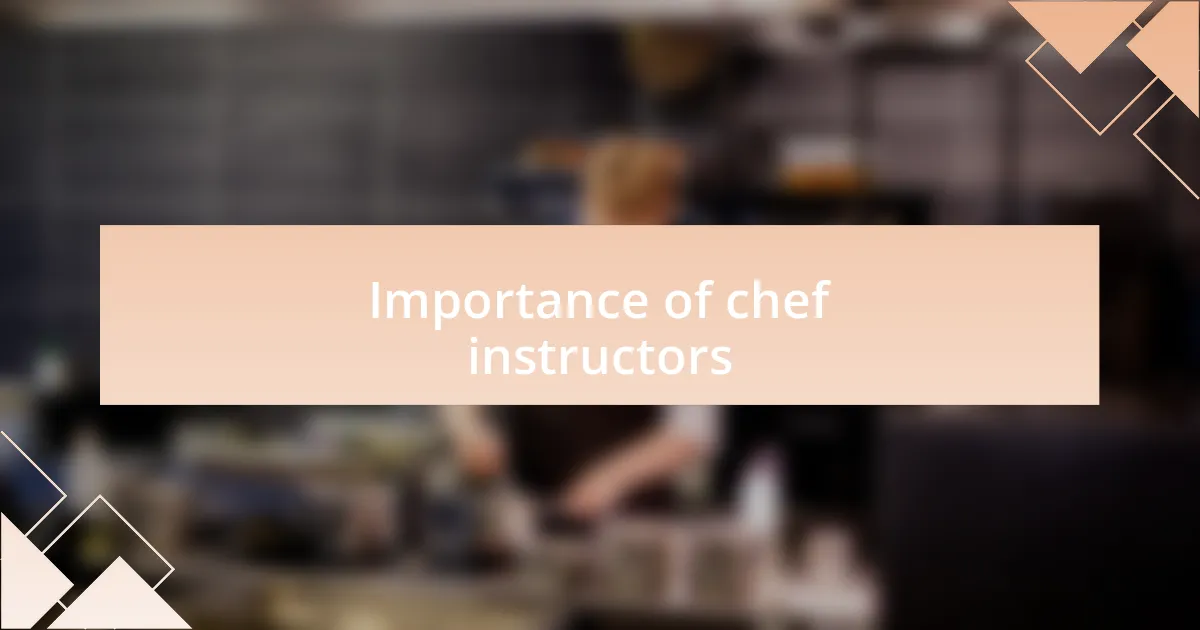
Importance of chef instructors
The role of chef instructors in culinary education is nothing short of pivotal. I’ve experienced firsthand how their passion and expertise can ignite a fire in students, transforming raw potential into skill. Have you ever noticed how a great instructor can turn a chaotic kitchen into a thriving space of creativity? Their ability to guide and inspire is essential for building confidence.
When I first learned the delicate art of pastry, my instructor would often remind us that precision is key. One of the most memorable moments was when she demonstrated the perfect technique for folding in ingredients, letting us feel the textures in our hands. It showed me that culinary skills aren’t just taught; they’re felt. This hands-on approach stands as a testament to the importance of having knowledgeable instructors who encourage exploration.
Moreover, chef instructors serve as mentors, shaping not only our culinary abilities but also our character. In a particularly stressful class, I saw one instructor calmly handle a kitchen mishap, turning it into a teachable moment. How different would my culinary journey have been without that level of support and guidance? Their influence often extends far beyond the classroom, instilling values like teamwork, dedication, and resilience that we carry with us beyond our culinary careers.
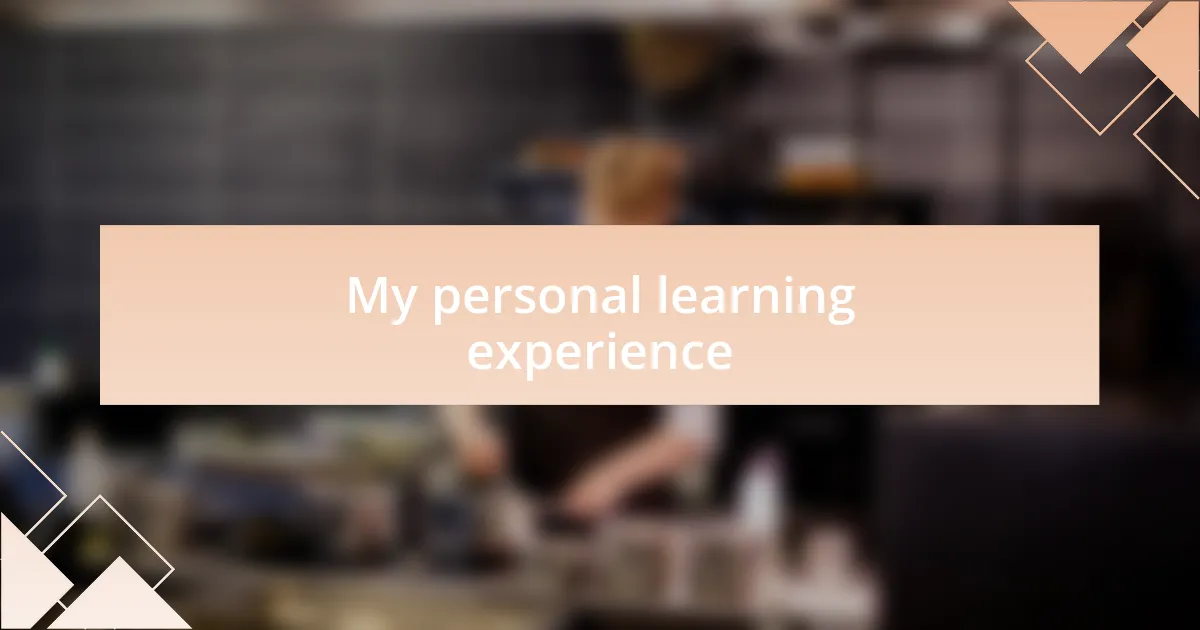
My personal learning experience
As I navigated my culinary education, one lesson that stood out was the significance of mistakes. I’ll never forget the time I burned a batch of beurre blanc. Instead of expressing disappointment, my instructor sat down with me, reviewing what went wrong in a way that felt more like a collaboration than a critique. It was in that moment I realized mistakes are stepping stones to mastery.
Every time I faced a daunting recipe, especially in baking, my instructor encouraged us to embrace challenges with curiosity. I can recall a day when we attempted a complex tart; I was hesitant and overwhelmed. Yet, seeing my instructor tackle each step with enthusiasm ignited a sense of courage in me. It became clear that cooking isn’t merely about following instructions; it’s about painting your own narrative on the plate.
Reflecting on my experiences, I often wonder how different my culinary journey would have been without my instructor’s supportive approach. They taught me that the kitchen can be a haven for creativity and self-discovery. The lessons I absorbed weren’t just about culinary techniques but also about trusting my instincts and finding joy in the process. Each dish became a canvas for exploring my identity as a chef.
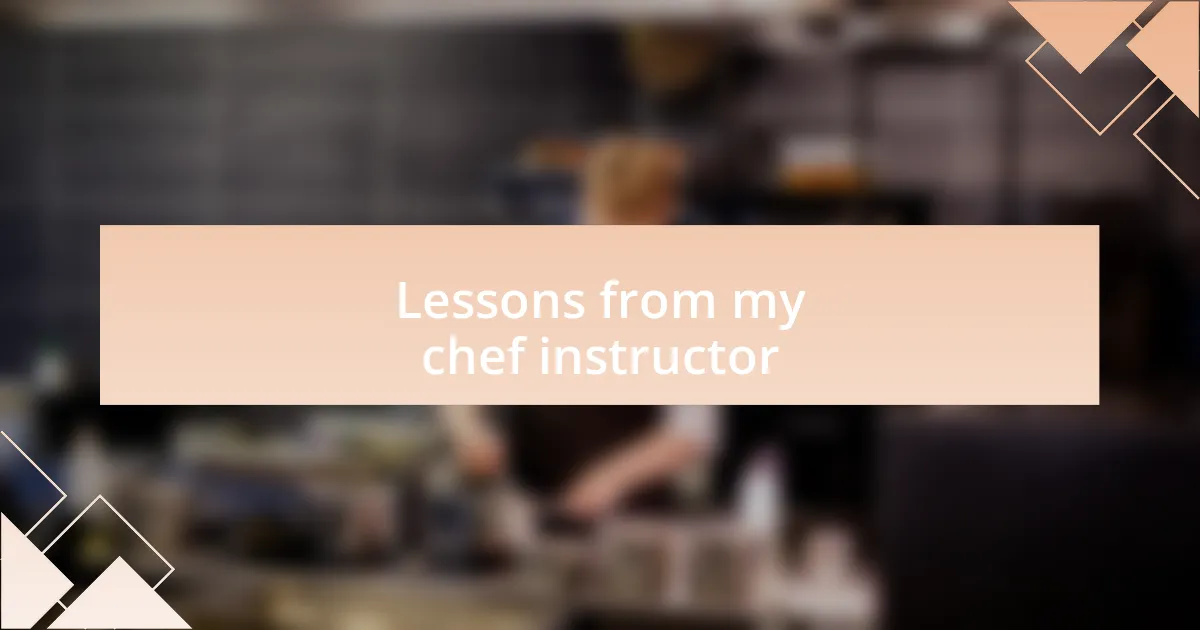
Lessons from my chef instructor
One lesson that resonated deeply with me was the emphasis on preparation. I vividly remember the day we were about to prepare for a dinner service and my instructor urged us to set up our mise en place meticulously. “How can you expect to create magic if you don’t have your tools ready?” they asked. That singular moment taught me that success in the kitchen often hinges on the groundwork laid beforehand, something I carry with me every day.
Another valuable takeaway was the importance of flavor layering. I can still hear my instructor’s voice encouraging us to taste as we cook, almost like a mantra. There was a particular instance when I made a simple tomato sauce; my instructor insisted that we had to balance acidity with sweetness. As I adjusted the seasoning, I discovered a profound connection between the ingredients and my own taste preferences. This exploration showed me how cooking is a dialogue between the cook and the ingredients, shaping a dish that reflects both skill and sensibility.
Finally, I learned that resilience is paramount in the kitchen. On a particularly challenging day, a dish I was proud of collapsed right before service. My instructor looked at me and said, “Failure is just another word for experience—now, what will you do next?” Those words struck a chord. I embraced the day as a lesson in perseverance and adaptability, realizing that every setback is an opportunity for growth. How often do we allow fear of failure to dictate our creativity? My instructor’s wisdom encouraged me to forge ahead, knowing that in each stumble lies the potential for greatness.
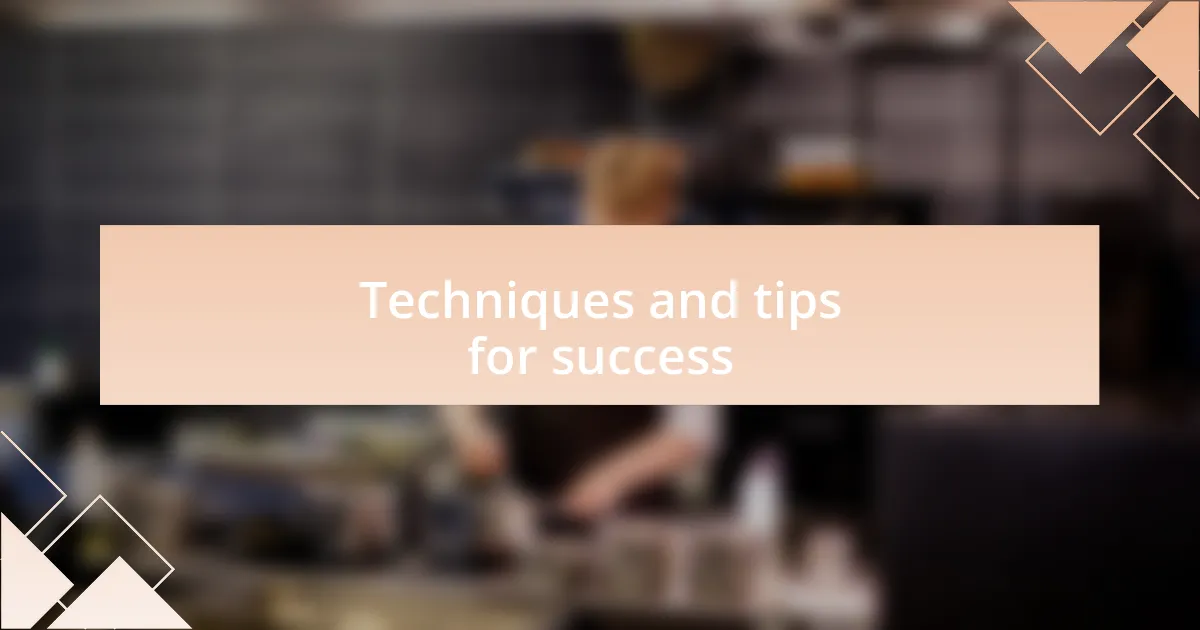
Techniques and tips for success
One technique that consistently came up during my culinary classes was the art of timing. I remember my instructor once shared a lesson that feels almost like a dance: everything in the kitchen has its rhythm. There was a moment when I was juggling multiple dishes, feeling overwhelmed. My instructor stepped in and calmly said, “It’s all about pacing yourself. Slow down, and you’ll find your flow.” This taught me that managing time not only improves efficiency but enhances the overall quality of the final dish.
Another vital tip for success that I often reflect on is the power of attention to detail. I’ll never forget the day when I was preparing a delicate dessert, and my instructor took a moment to point out how the smallest adjustments in plating could elevate the entire presentation. “It’s like telling a story,” they said, “each element plays a role.” That insight reshaped how I approach cooking, reminding me that aesthetics can enhance taste, and that each dish should be a feast for both the eyes and the palate.
Finally, the importance of asking questions cannot be overstated. In my early days, I often hesitated to seek clarification, thinking I needed to appear confident. One day, my instructor noticed my uncertainty and encouraged me to express my doubts. “Curiosity is your best tool,” they said with a warm smile. This moment instilled in me the understanding that every question asked is a step towards mastery. How can we expect to grow if we’re not willing to seek knowledge? Engaging openly with mentors and peers has become a cornerstone of my culinary journey, pushing my boundaries and expanding my skill set.